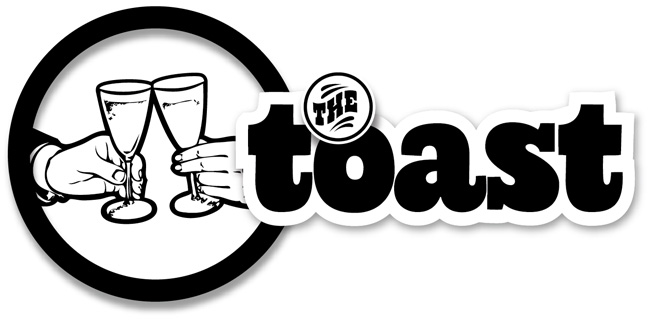 In this Toast we drink our way through the west metro, from Hayes Public House, a quaint Irish-style brewery, south to Wayzata Brew Works, a lakeside gathering place. Delano sits in between, and the tiny town claims two craft breweries of its own.
In this Toast we drink our way through the west metro, from Hayes Public House, a quaint Irish-style brewery, south to Wayzata Brew Works, a lakeside gathering place. Delano sits in between, and the tiny town claims two craft breweries of its own.
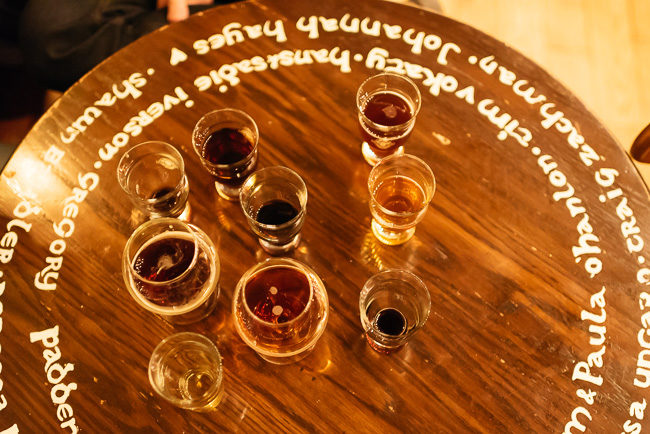
Hayes’ Public House
If there is anything that Hayes’ Public House is lacking, it is not an identity. The laser-sharp focus of owner and brewer Pugs Hayes has brought traditional British and Irish beers to life in the first brewery in Wright County since Prohibition.
The space has the feel of an updated Irish pub – green walls and dark wood throughout, plus hurling and soccer flags hanging from the ceiling along with a few mounted taxidermy pieces, not unlike Cooper in St. Louis Park or Merlin’s Rest in Minneapolis. It’s small and unexpectedly tucked into a strip mall. A mere 35 people make it feel comfortably full.
The least successful beer of the visit was the O’Ruaidhri’s Irish Red ($5 for 16oz). A strange apple aroma begins mildly but increases steadily over time. The taste has a residual sweetness that also presents as cider-like. Finally, a green banana flavor builds which is out of place and hides the amber malts which would normally dominate the style.
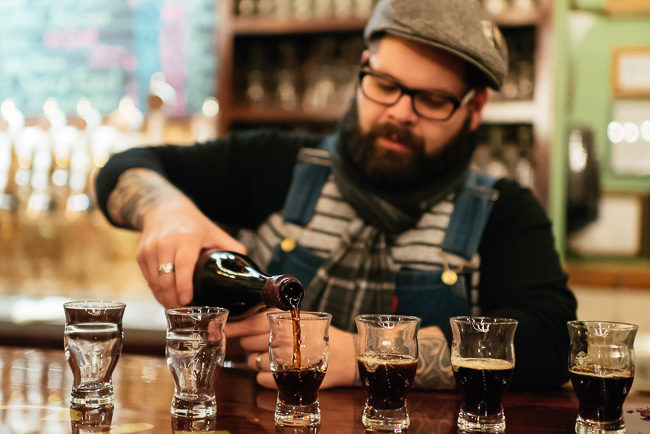
We found an excellent use of smoke in a few beers, none of which came off like chemical smoke. Hayes is quick to mention the use of beechwood-smoked malt, a German classic, which is regarded as the gold standard for adding subtle malts to beer. Despite his love of peat in spirits, Hayes steers clear of peated malt, a known brewing pitfall among smoky beers that can push the flavor out of balance.
During the visit, Hayes opened a bottle of The Revenge of the Dullahan, an imperial smoked coffee porter that is a higher gravity and smoky variation on the base porter. Only a small number of bottles were released, all of which were sold directly from the brewery. The smoke is initially potent, but after a few sips, more coffee presents itself. The java comes from adjacent Buffalo Coffee and Books and is added as liquid cold press coffee after fermentation but before packaging.
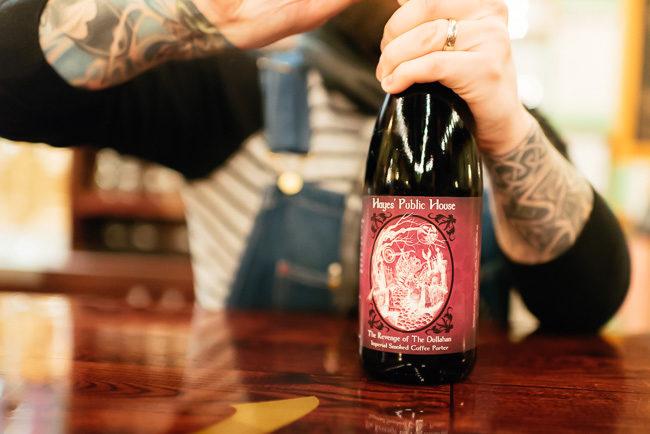
Finally, as a departure from the maltier styles which dominate the menu, the Session IPA stands out ($6 for 12oz). Strong resin and pine make it fairly one-note in hop profile. That said, the balance of bitterness, flavor, and aroma are solid. The bitterness lingers only briefly and the effervescence is refreshing. For only 4.9% ABV it is an extremely flavorful session style.
Hayes’ Public House 112 First St. South, Buffalo, MN 55313. 763.746.6389 Mon-Tue – Closed, Wed.-Thurs – 5-10 PM, Fri-Sat – 3-10 PM, Sunday – 2 -7 PM
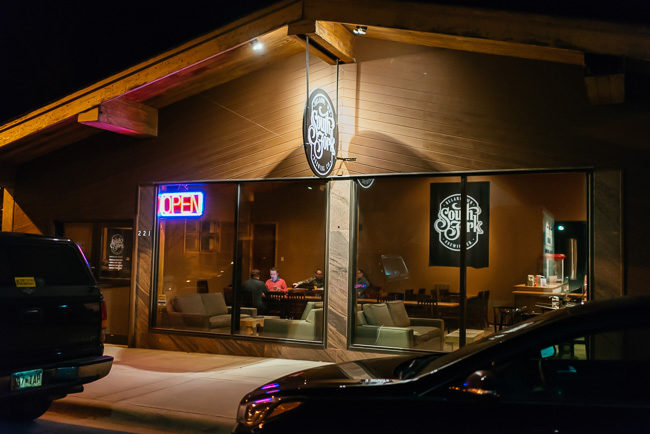
South Fork Brewing
A ten-minute drive away is Delano, home to South Fork Brewing which opened in 2015. Founders Sara Beamish and Karen Zimmerman own a 7-barrel system that is housed in a nondescript building in Delano’s historic downtown. Unlike the owner-brewer model at Hayes’, the pair employs head brewer Brett Lincoln, a local with homebrewing experience.
The taproom houses simple tables and a few couches, and has little character. A few board games are available and only two other tables were occupied on a Saturday night.
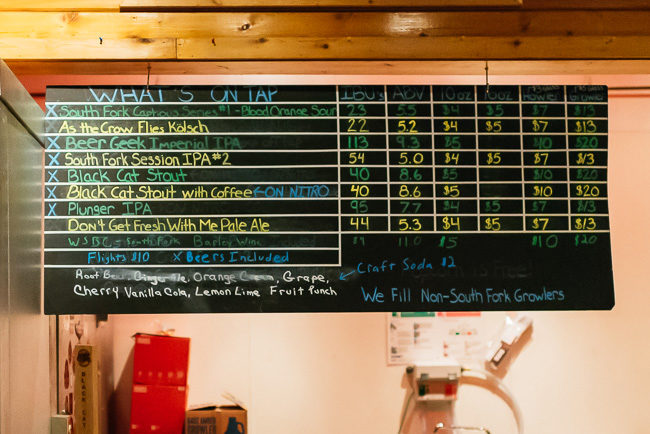
South Fork offers a flight option, which includes 6 pre-selected beers for $10.
The high point of the flight was the Blood Orange Sour with a slightly funky nose and crisp tartness. An intriguing orange-grapefruit finish tastes authentic rather than like candy. Compared to other sours on the market, however, there is little complexity. Unlike beers with intentional microorganism additions, this beer is left to sit in the fermenter to become sour. Wild yeast or bacteria naturally found on the grain will create this effect, a process called “kettle souring.”
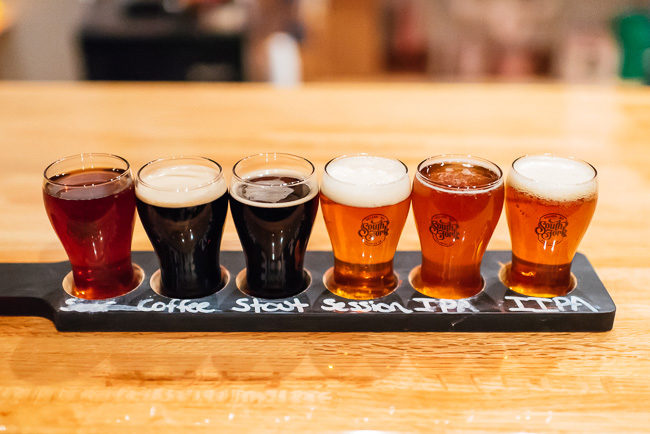
Black Cat Stout with Coffee has a powerful aroma but is a flop of a beer. It’s served on nitro, which produces a creamy body. Unfortunately, the aroma is of just-brewed coffee grounds while the flavor is jarringly bitter and acrid with almost no actual stout element. No malt flavor can be discerned from the burnt coffee aftertaste and the glass lacks depth of flavor.
Another miss was the South Fork Session IPA #2. The aroma is unusual, a combination of straw and rosewater with a vague tangerine element. It’s not entirely off-putting but is more apothecary than brewery. Upon sipping, the beer creates a sudden dryness in the mouth in a solvent sort of way. The flavor is potent mandarin and lacks any bitterness or hop flavor, while a floral note lingers. This unpleasant rose taste can occur from dry hopping while yeast are still very active.
Further fermentation problems present themselves in the Plunger IPA, including a strong aroma of clove and PVC pipe, known expressions of chlorophenol. While small amounts of some phenols are desirable in a handful of styles, IPAs do not include these flavors. There was little hop presence to stand up to the plastic-like taste. It was clear that this IPA was colonized by a wild yeast strain, likely due to infected equipment.
South Fork Brewing is approaching its two-year anniversary but seems to be making critical errors. It was a disheartening visit.
South Fork Brewing 221 2nd Street North Delano, MN 612-405-2337 Thursday 4-8pm Friday 4-10pm Saturday 2-10pm Sunday 11am-6pm
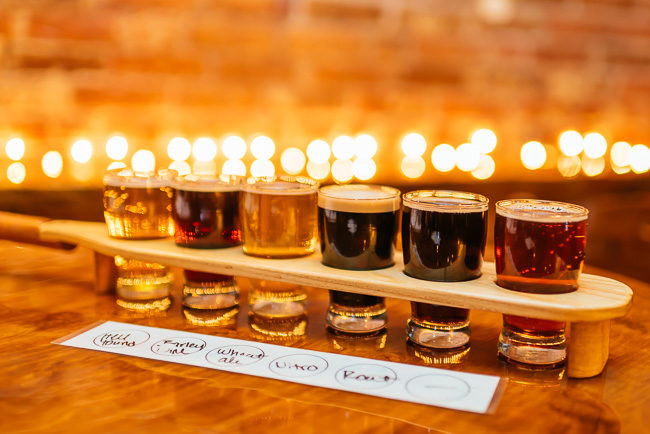
Lupine Brewing Company
One block west in Delano is Lupine Brewing Company, which feels worlds apart from its neighbor. The taproom staff are animated and insightful, while the space is inviting with brick on one side and a partial opening into the brewery on the other. There are mostly high tops and bar space which was over half full.
A beautiful example of the crisp and bright German Helles style called Hell Hounds, kicks off the flight of tasters ($2 for 5 oz, 6 per flight). This foreign-sounding lager is represented locally by the ubiquitous Hell by Surly Brewing Company, and this version is similar. Hell Hounds displays an excellent dry finish, which is more bitter than a cream ale and would appeal to Pilsner fans.
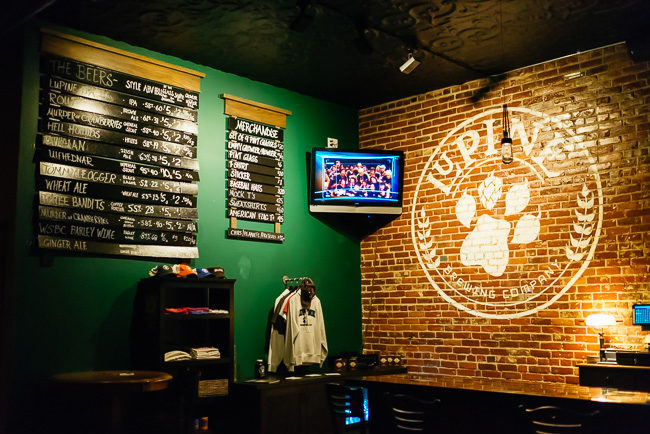
One sleeper hit was the Wheat Ale, whose name is regrettably vague. This one stands to be a widely-appealing example of a wheat that remains seasonally appropriate, rather than citrus-forward. We found this to be an appropriately understated, filtered take on a wheat, similar to a German kristallwiezen.
Murder of Cranberries is Lupine’s most distributed beer and, as a result, has become their flagship. The oatmeal stout with cranberries is far more beer than berry, with a brief tartness coming through only on the very finish. Nonetheless, the cranberry does round out a brew that would otherwise be mundane and perhaps too sweet.
Lupine is adjacent to the scenic Crow River, but the beers alone make this place a destination, though local patrons may not choose to advertise it this way. The current draft list skews dramatically malty, but this may be an indication of the season.
Lupine Brewing Company 248 N. River Street Delano, MN 763-333-1033 Wednesday and Thursday 4 to 10 pm, Friday 4 to 11 pm, Saturday 1 to 11 pm, Sunday 1 to 6 pm
Wayzata Brew Works
The word Wayzata may not conjure images of late winter, but Wayzata Brew Works has been plenty busy. On our first visit last fall, the Oktoberfest barely made it to October. This time, we experienced improved variety of beer, plus better service. That being said, the modest taproom would be a totally different environment during flip-flop season.
The beers were solid overall with few issues to speak of. The only error we spotted was in the Moore Moore Moore Lager. A faint cider note arises in what is otherwise a pleasant crackers and Cheerios experience. The taste is crisp with an unexpected bitter exit. But significant green apple, called acetaldehyde in brewing chemistry, grows over time and becomes hard to ignore.
Without flaw is the Skinny Dipper Kolsch. The brilliant, effervescent beer with a mild aroma only suffers from the fact that it lacks the personality that the German hybrid is known for. Though it fits into the style, it demonstrates no esters, minerality, or complexity that the traditional examples encourage. It reads more like a German or American lager, and a change of yeast strain or fermentation temperature could potentially solve this.
On the other hand, the Berry Gose is classically tart and displays balance between moderate sourness and a jam-like conclusion. The fruit addition prevents the puckering effect and the aroma is floral with potent under-ripe raspberry.
Finally, the Deuces New England Style Double IPA isn’t a perfect example of the style, but it’s close. The aroma is strong apricot and papaya from Mosaic and Australian Vic Secret hops. It’s juicy and hazy, and sits moderately heavily on the palate due to low carbonation. The New England trend in hoppy beer capitalizes on the unfiltered nature of proteins in beer to hold the hops in suspension, creating an intense aroma and flavor. The significant bitterness may be a bit heavy-handed after half a glass, but it does truncate the initial sweetness well
The taproom itself isn’t quite cohesive. The marine stylings and classy wood and glass finishings are overshadowed by stark blue lights and stage lighting, and the smell of popcorn can become overpowering at times. It is this lack of attention to detail that detracts from the overall experience and prevented us from lingering beyond a round or two.
Eight west metro breweries have recently brewed the same barleywine recipe, in part for a release at Winterfest, but also to drive beer tourism to the area. The recipe, developed primarily by the brewers at Birch’s on the Lake and Schram Vineyards, falls squarely into the American Barleywine territory due to the intensity of hops. We tasted examples at three of the participating breweries, including Lupine and Wayzata.
The WMBC Barleywine fell short due to its intense alcoholic heat and sharp bitterness. It will likely get better with time as booziness and hops blend into their surroundings appropriately. As each version had the same problems, the problem was with the recipe and the timeline, not the execution.
Wayzata Brew Works 294 Grove Ln E, Wayzata, MN (952) 737-1023 Monday & Tuesday Closed, Wednesday & Thursday 4pm – 11pm, Friday 2pm – 12am, Saturday 12pm – 12am, Sunday 12pm – 6pm

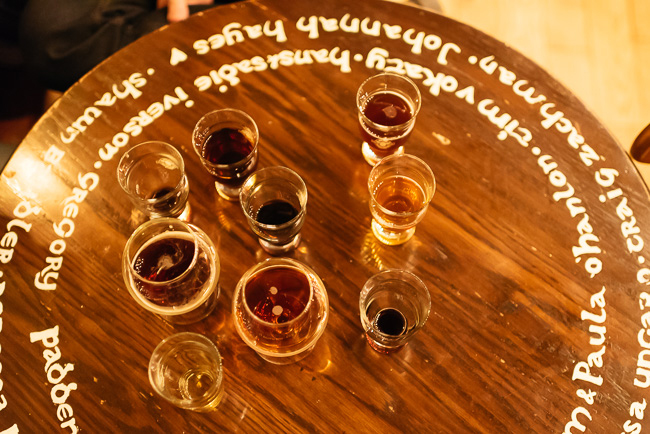
Kettle souring is done prior to boil, in the mash or boil kettle, not the fermenter. The advantage is that the bacteria is killed off prior to fermentation so the process takes hours instead of weeks or months.